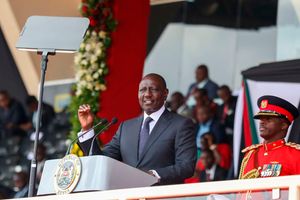
President William Ruto’s punitive taxes have created two sets of Kenyans.
When the October pay hit bank and mobile accounts of salaried Kenyans, many would already have been expecting to see 2.75 per cent chalked off for the new controversial medical cover scheme.
But this – the third invasion of the pay slip by the government since President William Ruto took office 26 months ago, and the fourth for those with a monthly pay of Sh500,000 and above – did not make the deduction any more palatable.
The 2.75 per cent was slashed for the first time to go towards the Social Health Insurance Fund (SHIF) medical cover being implemented by the Social Health Authority (SHA).
President Ruto first raided salaried workers in February 2023, when the Court of Appeal upheld the National Social Security Fund Act No 45 of 2013, raising pension contributions from Sh200 to 1.2 per cent, half of which is paid by the worker and the other half by the employer.
The NSSF contributions were, however, capped at a maximum of Sh2,160 for those earning more than Sh18,000.
But even before Kenyans could adapt to the lower pay, President Ruto hit them with a 1.5 per cent Housing Levy through the Finance Act, 2023.
Employees were relieved when courts delayed its implementation. The reprieve was, however, short-lived as the levy was given the legal clearance this year. It has become a sore fixture on workers’ pay slips.
This is not forgetting the agony of high-income earners, who were also slapped with a higher Pay-As-You-Earn (PAYE) tax in July 2023 through the Act.
The PAYE for those who earn more than Sh500,000 a month is 32.5 per cent, up from 30, while those who earn more than Sh800,000 are paying the tax at 35 per cent.
While these deductions have been effected on the pay of private and public workers, the latter have a soft landing, given their fat allowances and pay increments, privileges which help cushion them from the full impact of the deductions.
Civil servants also enjoy security of tenure, and – coupled with the pay perks – have made government jobs highly sought-after by thousands of unemployed people amid the joblessness scourge which continues to grow.
To paint a clearer picture of the growing difference in fortunes between public and private sector workers, civil servants get an automatic pay rise of three per cent every year to help their earnings keep up with the rise in the cost of living.
The increase is funded through taxes. The government also implemented a Sh1.5 billion pay rise for civil servants in September to avert a strike.
Under the deal, civil servants got an increment of Sh1,300 to Sh5,000 as well as improved house allowances of up to Sh80,000.
The pay rise was backdated to July, when implementation of the second phase of the Collective Bargaining Agreement (CBA) signed between the government and civil servants was to start.
Lawmakers, who approve these punitive additional taxes, have a raft of allowances through which they pad their pay to cover for the deductions.
They include foreign and local travel perks, mileage claims and committee sitting allowances.
In March, MPs had attempted to increase Parliament’s budget by Sh2 billion, seen by Kenyans as a scheme to cover for the pay reduction following the implementation of the Housing Levy.
This additional budget is, however, among allocations that were dropped in the supplementary budget in July following the Gen Z protests that forced the withdrawal of Finance Bill, 2024.
It has now emerged that the medical cover of civil servants is still under the National Health Insurance Fund (NHIF).
What this means is that civil servants have largely been spared the agony private sector workers are going through during the transition to SHA.
The change has been chaotic, to say the least, with thousands of patients being forced to settle medical expenses out-of-pocket due to system hitches.
Some hospitals have refused to accept the new medical insurance.
A civil servant who spoke to the Daily Nation revealed that NHIF is still covering their medical expenses.
The Daily Nation understands that civil servants have been given a window of transition to the new medical scheme, which will lapse at the end of November.
“We are still using NHIF when we go to hospital. We have been given a transition period until the end of this month,” the government employee said.
Workers in the private sector are grappling with declining salaries as companies struggle under the weight of high costs and poor demand.
Employees on permanent and pensionable terms are being laid off and “lucky” ones recalled on short-term contracts as companies look to cut their staff costs to size.
The irony is, the invasion of workers’ pay not only hurts the employees and their dependants but also the government itself through low tax revenue collections.
The Kenya Revenue Authority (KRA), the tax agency that is at the centre of President Ruto’s aggressive tax collection measures, is already reporting a decline in PAYE collections, thanks to redundancies declared by private companies nearly driven out of business by high taxes and a struggling operating landscape.
In its October highlight, KRA noted that among taxes with poorest performance was PAYE from the private sector, which had a Sh1.2 billion deficit during the month.
“This is explained by reduction in average monthly cash pay per employee from Sh78,034 in June-September 2023 down to Sh75,781 in June-September 2024, pointing to the effects of ongoing restructuring by various organisations to manage operational costs,” KRA said in an internal document.
The revelation by KRA shows that overall, monthly earning for private sector employees has fallen by 2.9 per cent.
The struggles by employees in the private sector have been on display throughout the year, with Central Bank of Kenya (CBK) surveys showing companies laying off employees because of struggling business.
Slash allowances
The CBK September Market Perceptions Survey showed that one in four firms has dismissed permanent employees this year, with just one in 10 adding such positions.
The survey also showed that while only 13 per cent of companies have hired casual workers this year, close to half (42 per cent) of firms have laid off casuals.
“Respondents were asked how the number of permanent, contract and casual employees in their companies compare with those in a similar period in 2023. The responses showed that 59 per cent of banks hired permanent staff in 2024 compared with only 10 per cent of non-banks. At the same time, 25 per cent non-bank companies have laid-off permanent staff in 2024, compared with only four per cent of banks,” the survey noted.
“The survey findings, therefore, show that non-banks have employed less and laid off more in 2024 compared with banks.”
IMF loan programme
In the latest International Monetary Fund (IMF) report on its loan programme with Kenya, the multilateral lender chided Nairobi for its inability to withstand pressure to raise public servants’ salaries.
“Spending measures are subject to considerable risks as pressure is already materialising. Risks include a reversal of top-down across-the-board spending cuts as spending pressures emerge,” the IMF said in the report released this month.
“Indeed, while the supplementary included a small provision for agreed CBAs, the government has agreed to demands from the security sector, teachers and civil servants to honour the CBAs, leading to wage bill pressures of more than 0.1 per cent of the Gross Domestic Product that more than offset the envisaged wage bill savings.”
As per the lender’s calculations, the salary increases for teachers, civil servants and workers in the security sector will cost the government an additional Sh16 billion.
Slash allowances
IMF continues to put pressure on the government to slash allowances to public servants and go strong on using the Salaries and Remuneration Commission (SRC) to stop unions from demanding higher pay.
“To this end, efforts to streamline the wage bill by rationalising allowances, implementing a common HR and payroll system and ensuring that CBAs are aligned with available resources should generate substantial, permanent savings,” its staff said in the appraisal.
The National Treasury told the lender that while SRC froze upward review of salaries for state officers following the withdrawal of the Finance Bill, 2024 and deferred annual pay increments for public officers, the decisions were reversed due to pressure from unions.
“In July 2024, and because of the emerging fiscal constraints and budget cuts emanating from the withdrawal of the 2024 Finance Bill, the SRC froze the upward review of salaries for state officers. In addition, the commission deferred the implementation of the scheduled annual salary review for other public officers in the Financial Year 2024/25 until further notice, contingent upon the availability of funding,” Treasury said.
“In view of pressure to implement CBAs with trade unions, the SRC decisions have been reversed since, with these pressure to be funded from additional revenue efforts.”
The IMF is pressing the Kenyan government to impose more higher taxes, saying what has been reintroduced cannot plug the budget deficit.











